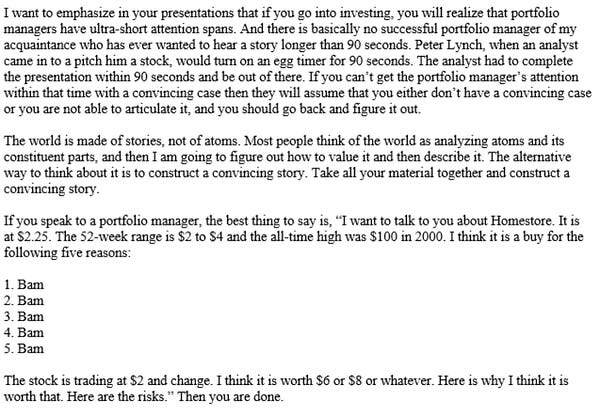Workshop Note: Inventing Yourself
“The things you think about determine the quality of your mind. Your soul takes on the color of your thoughts.” Marcus Aurelius
Hi all,
I went to the Metropolitan Museum earlier this week and came across this beautiful bust of Marcus Aurelius. Back home I pulled out my copy of Meditations and skimmed through my highlights.
“The things you think about determine the quality of your mind. Your soul takes on the color of your thoughts.” Marcus Aurelius
How very true and topical as I am working on changing my mindset. Less disillusioned cynic. More optimistic builder. Less worrying about the future and ruminating about the past. More presence.
Which brings me to my writeup about David Geffen (thread). At least according to his biography, The Operator, Geffen is not exactly a stoic. He could take things very personally and react with fury. That said, Geffen had had a falling out with the author and I would not be surprised if the book ended up a bit biased as a result. After publishing my piece, I watched the documentary Inventing David Geffen on Netflix which was, unsurprisingly, much less critical.
Tim Ferriss once mused with Josh Waitzkin that “hyper-function and dysfunction are often right next to each other” and Geffen strikes me as a good example. On the one hand, he displayed an incredible talent for charming and connecting with artists. He was “the man” in their corner, promoting them, supporting them, negotiating on their behalf.
On the other hand, Geffen seemed not to hesitate to wield his power against people, even friends, if he felt they had crossed him or stood in the way of a deal. I wish use the search function to find the number of times the word “scream” appeared in the book.
Either way, one can’t help but admire the ambition and drive that propelled Geffen to the top. He dropped out of college and there was not much help from his family to get started. He did however pick up some valuable skills from his mother: how to negotiate, sell, and run an efficient business.
But his big break came when Geffen started to cultivate mentors. He climbed the ladder at lightning speed and made powerful friends who made it possible for him to launch his own record label. In his acceptance speech for the Rock & Roll Hall of Fame he described himself as having “no talent except for being able to enjoy and recognize it in others.” True, unless you consider being an expert negotiator a talent😉
“I’ve always thought that each person invented himself. That we are each a figment of our own imagination. And some people have a greater ability to imagine than others.” David Geffen
Origin stories
To get into the mailroom of the William Morris agency, where Geffen worked alongside Barry Diller, Geffen lied about having a degree from UCLA. When he heard that the agency had asked the school to confirm this fact, he spent his early mornings trying to intercept the letter. He replaced it with a forgery and turned the escapade into a key piece of his origin story.
While I don’t think this would play well today, I believe it can be very valuable to have a well crafted origin story. Whether you’re trying to raise money or find a job: it is much more engaging to present your background as a story rather than a sequence of events. You can also use this story to emphasize a key point you’re trying to get across. And what makes for a good story? Conflict. And change that resulted from overcoming adversity.
If you are an investment manager focused on culture, what would make for a better origin story than a near-death experience that forced you to re-examine and improve your culture? Well, take a look at how WCM Investment Management framed theirs:
"According to industry logic, we had no right to live to fight another day. And yet we did. Bad times ultimately reveal the culture of any enterprise."
Pile on the challenges. Escalate. Set the stage for death and rebirth.
This is from a great piece they published called "Why do money managers fail?" (thread).
"I believe money management firms close their doors for one primary reason: a toxic culture."
It might sound like “man with a hammer” syndrome if a culture-focused investor believes culture is the culprit for failure. But I found the paper insightful and agree that bad culture can become a serious problem as it repels talent and degrades communication and cooperation.
"In time, those responsible for the original success leave and the institutional bureaucrats take over, causing continued erosion of what once made the firm great. Few firms endure if they fail to create a second generation with both a founders' mentality and the financial incentives needed for healthy growth."
"For many years, we thought we had all the ingredients of a healthy culture. However, it became clear we were missing one important ingredient: truth-telling. We weren't systematically, consistently having the necessary tough conversations. Evasion masked as politeness led to internal confusion, lack of alignment, and, ultimately, a lot of unnecessary drama.
Personally, I haven’t been good at telling my origin story. I stumble over details or get lost in anecdotes. I confuse myself wondering what the turning point will be. It works better when I write it up and have the luxury of distilling it down to a key conflict.
But if we are, as Geffen said, figments of our own imagination, then our origin story can serve as the powerful foundation on which to envision a beautiful future. However, as soon as I wrote this I was reminded of a quote from Eckhart Tolle, whose book I am currently listening to: “have your dwelling place in the now and pay brief visits to past and future.”
In other words: be present and don’t obsess over the past. Refine your origin story, but don’t cling to it. Don’t let it dictate your path. Mold it, such that it opens the next gate. Because it is not who you are. It is just a story.
Updates
I added a table of contents for and will be adding twitter threads to the posts over time.
I recorded a conversation with Dominique Mielle today, former partner at distressed hedge fund Canyon Partners and author of a new book, Damsel in Distressed. It is her reflection on both investing and the business of investing and I really enjoyed the opportunity to her.
Conversation between Bill Miller and William Green
A discussion about investment philosophy with William Green, author of Richer, Wiser, Happier who also profiled Miller back in 2001. The format is a video, a bit unfortunate for those of us used to podcasts. But I would at least recommend going to minute 23 (thread) to learn about the time a young Bill Miller made 50x his money in Fannie Mae because of a meeting with Peter Lynch.
Miller used that story as a metaphor when he was being slammed by fellow value investors for his investment in Amazon (around the time of the amazon.bomb cover). To be fair, Amazon stock did fall sharply during the dot-com bust. Miller averaged down all the way and bought convertible bonds.
In the conversation, Miller also "amended slightly" his definition of value investing:
From "finding businesses at a discount to what they're currently worth" to "buying them at a discount to what you believe they will be worth with a sufficient margin of safety."
Pitch
How to pitch a stock to a portfolio manager. Really: how to pitch anything to busy people. Get your hooks in fast. Immediately show why this is a story worth spending time on. I should keep this in mind when I write my opening paragraphs😇
Twitter rabbit holes

The amazing detail in old Soviet maps:









